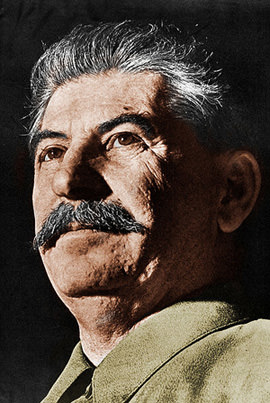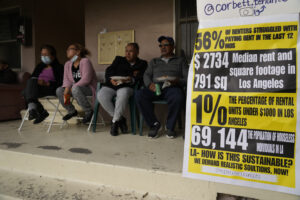Tea Party Financiers Owe Their Fortune to Josef Stalin
The members of the Koch family, America's biggest financial backers of the tea party, would not be the billionaires they are today were it not for the godless empire of the USSR.
By Yasha Levine, AlterNetThis article was originally posted by AlterNet.
The Tea Party movement’s dirty little secret is that its chief financial backers owe their family fortune to the granddaddy of all their hatred: Stalin’s godless empire of the USSR. The secretive oil billionaires of the Koch family, the main supporters of the right-wing groups that orchestrated the Tea Party movement, would not have the means to bankroll their favorite causes had it not been for the pile of money the family made working for the Bolsheviks in the late 1920s and early 1930s, building refineries, training Communist engineers and laying down the foundation of Soviet oil infrastructure.
The comrades were good to the Kochs. Today Koch Industries has grown into the second-largest private company in America. With an annual revenue of $100 billion, the company was just $6.3 billion shy of first place in 2008. Ownership is kept strictly in the family, with the company being split roughly between brothers Charles and David Koch, who are worth about $20 billion apiece and are infamous as the largest sponsors of right-wing causes. They bankroll scores of free-market and libertarian think tanks, institutes and advocacy groups. Greenpeace estimates that the Koch family shelled out $25 million from 2005 to 2008 funding the “climate denial machine,” which means they outspent Exxon Mobile three to one.
I first learned about the Kochs in February 2009, when my colleague Mark Ames and I were looking into the strange origins of the then-nascent Tea Party movement. Our investigation led us again and again to a handful of right-wing advocacy groups directly tied to the Kochs. We were the first to connect the dots and debunk the Tea Party movement’s “grassroots” front, exposing it as billionaire-backed astroturf campaign run by free-market advocacy groups FreedomWorks and Americans For Prosperity, both of which are closely linked to the Koch brothers.
But the Tea Party movement — and the Koch family’s obscene wealth — go back more than half a century, all the way to grandpa Fredrick C. Koch, one of the founding members of the far-right John Birch Society which was convinced that socialism was taking over America through unions, colored people, Jews, homosexuals, the Kennedys and even Dwight D. Eisenhower.
These days, the Kochs paint themselves as true-believer Libertarians of the Austrian School. Charles Koch, the elder brother who runs the family business in Wichita, Kansas, quotes the wisdom of proto-libertarian “economist” Ludwig von Mises, but also sees himself as an economist in his own right. In 2007, Charles made his contribution to the body of free-market thought with an economic theory he calls “Market-Based Management” (a term he trademarked).
David Koch is the highbrow brother who lives in New York. He ran as the Libertarian party candidate for president in 1980 and says his dream is to “minimize the role of government, to maximize the role of private economy and to maximize personal freedoms.” Apparently everyone’s a free-market enthusiast at Koch Industries, including its spokeswoman, who recently wrote a letter to the New York Times stating that “it’s a historical fact that economic freedom best fosters innovation, environmental protection and improved quality of life in a society.” It might be true somewhere for someone, but not for the Kochs — they owe it all to socialism and totalitarianism.
Here is a better historical fact, one that the Kochs don’t like to repeat in public: the family’s initial wealth was not created by the harsh, creative forces of unfettered capitalism, but by the grace of the centrally planned economy of the Soviet Union. The Koch family, America’s biggest pushers of the free-market Tea Party revolution, would not be the billionaires they are today were it not for the whim of one of Stalin’s comrades.
The story of how the Koch family amassed its socialist wealth starts at the turn of the 20th century with the birth of Fredrick C. Koch. Fred was born in a tiny north Texas town to a Dutch immigrant and newspaper publisher. The historical record is not clear about the family’s wealth, but it appears that great-granddaddy Koch was not hurting for cash, because Fred Koch turned out to be a smart kid and was able to study in MIT and graduate with a degree in chemical engineering. A few years later, in 1925, Fred started up the Winkler-Koch Engineering Company with a former classmate, quickly developing and patenting a novel process to refine gasoline from crude oil that had a higher yield than anything on the market. It was shaping up to be an American success story, where anything was possible with a bit of elbow grease and good ol’ ingenuity.
The sky was the limit — until the free market rained on Fred’s parade.
See, Fred was living through the Roaring Twenties, a time of big business, heavy speculation and zero government regulation. Much like today, cartels were free to form and free to fix — and so they did. Sensing a threat to their royalty-revenue stream from Winkler-Koch’s superior refining technology, the reigning oil cartel moved in to teach the young Koch how the laissez-faire business model worked in the real world.
“[W]hen he tried to market his invention, the major oil companies sued him for patent infringement. Koch eventually won the lawsuits (after 15 years in court), but the controversy made it tough to attract many U.S. customers,” according to Hoover’s Company Records service. Just like that, Winkler-Koch Engineering found itself squeezed out of the American market. They had a superior product at a cheaper price, but no one to sell it to.
Luckily, there was one market where opportunity beckoned and innovation was rewarded: the Soviet Union.
Stalin’s first Five-Year Plan was just kicking into action a nation-wide industrialization effort, and Soviet planners needed smart, industrious college grads like Fred Koch. The Soviet Union was desperately trying to increase its oil refining capacity, so oil engineers were especially in high demand — and well paid, too.
“We are the world’s greatest market, and we are prepared to order a large amount of goods and pay for them,” Joseph Stalin told an American journalist in 1932. Stalin wasn’t kidding. From 1926 to 1929, the Soviet oil industry bought $20 million worth of equipment. And Koch was about to get in on the action.
In 1929, after hosting a delegation of Soviet planners in Wichita, Kansas, Winkler and Koch signed a $5 million contract to build 15 refineries in the Soviet Union. According to Oil of Russia, a Russian oil industry trade magazine, the deal made Winkler-Koch into Comrade Stalin’s number-one refinery builder. It provided equipment and oversaw construction:
The first Winkler-Koch plants were set up in Tuapse in 1930. The cracking unit operated commendably, and would in the future be the type preferred by the heads of the Soviet Union’s petroleum industry when purchasing new cracking equipment. In 1931, two Winkler-Koch cracking units were launched in Baku, another two in Batumi, and six at once in Grozny; the last had a combined refining capacity of 900,000 tons per year. In 1932, a Winkler-Koch unit commenced operations in Yaroslavl.
At the time, the Soviet Union’s oil industry was a total mess. Equipment built by Western engineering firms was always breaking down or didn’t work at all. Western engineers were constantly being accused of espionage or sabotage, real or imagined, and booted out of the country. Soviet workers suspected of colluding with the foreigners were simply taken out back and shot. Winkler-Koch made sure it was running a tight, efficient operation. Unlike his Western competitors, Koch pleased his Soviet clients by ensuring top quality and helping the cause of socialism.
The Soviet oil planners were delighted with Koch’s refineries. The communists were so impressed they kept giving Winkler-Koch business and regularly sent Soviet engineers to train in Wichita. It was a sign of growing mutual trust.
By the time he got out in 1933, Koch earned $500,000, which was a ton of money for a kid fresh out of college. This nut of money served as the foundation for the family’s future assets, which Koch no doubt started acquiring at rock-bottom prices. After all, 1933 was one of the two worst years of the Great Depression — all assets were priced to go at 90 percent off. In the end, the capitalist-hating socialists ended up treating Koch fairly, way better than the monopolistic thrashing he got from his native land. So you’d think he’d at least something good to say about the Soviet Union when he got home.
Nope, not at all. He hated the commies, but for some reason he kept it to himself until the late 1950s (possibly because he was still doing work for the Soviet Union). Then, after coming back from a trip to the Soviet Union in 1956, he flew off the handle. According to a 1956 AP article, Fred Koch was among 11 prominent residents of Wichita, Kansas who traveled to Moscow “in an effort to convince the Russian people that Soviet propaganda about capitalists is untrue.” Sounds like the perfect cover for a business trip.
It’s not clear what he was actually doing there. But whatever the outcome — maybe he didn’t get the contract he was expecting or maybe he got swindled out of some investment or maybe he plain hated the thaw of post-Stalin Russia — Fred Koch came back a pissed-off anti-communist and joined up with the right-wing Birchers. He bankrolled a John Birch Society chapter in Wichita and attempted to open a Bircher bookstore, which wasn’t too popular and had to close.
He warned of a massive communist conspiracy to take control of America, saying that the Reds were eroding American universities, churches, political parties, the media and every branch of government. “Maybe you don’t want to be controversial by getting mixed up in this anti-communist battle,” Koch said in said in a speech to a Women’s Republican Club in 1961. “But you won’t be very controversial lying in a ditch with a bullet in your brain.”
In 1961, Koch published a pamphlet titled “A Businessman Looks At Communism,” in which he recounted his travels with a “hardcore Communist” named Jerome Livshitz. It was from Livshitz that Fred Koch first learned about the commie conspiracy to take over America:
The government detailed a little man by the name of Jerome Livshltz to go around to our various installations with me. Livshitz had taken part in the revolution of 1905, and had spent twelve years in the U.S.A. as a revolutionary, most of the time in jails….
In the months I traveled with him he gave me a liberal education in Communist techniques and methods. He told me how the Communists were going to infiltrate the U.S.A. in the schools, universities, armed forces and to use his words, “Make you rotten to the core.” I believe that due to his American experience he was one of the original architects of the Communist plan of subversion of the U.S.A.
My associate and I pulled him from under an overturned car in Tiflis, and he was amazed. “Why did you save my life?” he said. “We are enemies. I would not have saved yours. Perhaps when the turn there, I will spare your lives.” He told me that if his own mother stood in the way of the revolution he would strangle her with his bare hands. This is the mark of a hard-core Communist. They will do anything — anything.
Fred Koch’s paranoia continued to spiral out of control until his ticker quit in 1967. But by that time his son, Charles G. Koch, had already taken over control of the family business. He appropriated his father’s communist paranoia and made it the basis of the family’s free-market business philosophy.
“Once, my father ran a business in the ex-Soviet Union, and all engineers who worked with my father were imprisoned by Stalin later. My father, who had experienced this, became an anti-communist and thought the value of economical freedom and prosperity was more important than ever before,” Charles said during an interview with a Korean newspaper in 2008, leaving out the part how evil socialist cash was the foundation of the Koch family’s wealth.
Once he took over, it was clear that Charles had big plans for Koch Industries. He was going to push the limits of corporate growth by plowing 90 percent of the company’s profits back into the till and diversifying to the max. It worked. The company expanded at an unreal rate: its revenues increased from $100 million in 1966 to $100 billion in 2008 — that’s 1,000-fold growth.
Today, it operates thousands of miles of pipelines in the United States, refines 800,000 barrels of crude oil daily, buys and sells the most asphalt in the nation, is among the top 10 cattle producers, and is among the 50 largest landowners. Koch Industries also poured hundreds of millions of dollars into right-wing organizations like Institute for Humane Studies, the Cato Institute, the Mercatus Center at George Mason University, the Bill of Rights Institute, the Reason Foundation, Citizens for a Sound Economy and the Federalist Society — all of them promoting the usual billionaire-friendly ideas of the free market, deregulation and smaller government.
If that expansion looks too fast to be legit, that’s because it was.
William Koch, the third brother who had a falling-out with Charles and David back in the ’80s over Charles’ sociopathic management style, appeared on “60 Minutes” in November 2000 to tell the world that Koch Industries was a criminal enterprise: “It was – was my family company. I was out of it,” he says. “But that’s what appalled me so much… I did not want my family, my legacy, my father’s legacy to be based upon organized crime.”
Charles Koch’s racket was very simple, explained William. With its extensive oil pipe network, Koch Industries’ role as an oil middleman–it buys crude from someone’s well and sells it to a refinery–makes it easy to steal millions of dollars worth of oil by skimming just a little off the top of each transaction, or what they call “cheating measurements” in the oil trade. According to William, wells located on federal and Native American lands were the prime targets of the Koch scam.
“What Koch was doing was taking all these measurements and then falsifying them on the run sheets,” said Bill Koch. “If the dipstick measured five feet 10 inches and one half inch, they would write down five feet nine and one half inches.”
That may not sound like much, but Bill Koch said it added up. “Well, that was the beauty of the scheme. Because if they’re buying oil from 50,000 different people, and they’re stealing two barrels from each person. What does that add up to? One year, their data showed they stole a million and a half barrels of oil.”
In 1999, William decided to take his brothers down. He sued Koch Industries in civil court under the False Claims Act, which allows whistleblowers to file suit on behalf of the federal government. William Koch accused the company of stealing hundreds of millions of dollars in oil from federal lands.
The band of brothers settled the case two years later, with Charles agreeing to pay $25 million in penalties to the federal government to have the suit dismissed. It turned out to be a great deal for Charles and David, considering that in the 1980s their “adjustments” allowed Koch Industries to siphon off 300 million gallons of oil without paying. It was pure profit–free money–to the tune of $230 million.
At the trial, 50 former Koch gaugers testified against the company, some in video depositions. They said employees even had a term for cheating on the measurements. “We in the company referred to it as the Koch Method because it was a system for cheating the producer out of oil,” said one of the gaugers, Mark Wilson.
Ah, finally! Have we stumbled onto the secret to the family’s success? At the bottom of it all, is the Koch Method that funds all the libertarians nothing but old-fashioned theft? Or, as Koch hero Ludwig von Mises might ask, “Is the Koch Method just an unceasing sequence of single thefts?”
Your support matters…Independent journalism is under threat and overshadowed by heavily funded mainstream media.
You can help level the playing field. Become a member.
Your tax-deductible contribution keeps us digging beneath the headlines to give you thought-provoking, investigative reporting and analysis that unearths what's really happening- without compromise.
Give today to support our courageous, independent journalists.






You need to be a supporter to comment.
There are currently no responses to this article.
Be the first to respond.